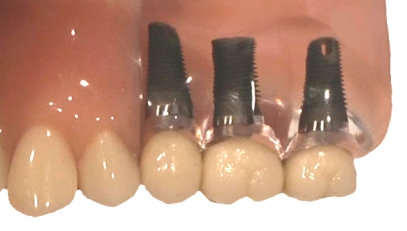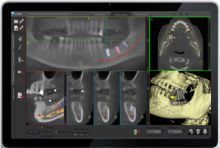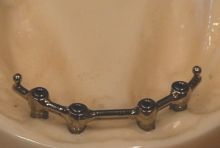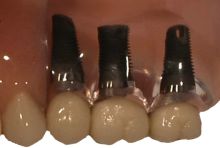Dental Implants to Replace Several Teeth

Dental Implants to Replace Several Teeth are appropriate when several teeth are missing and a patient does not want a removable denture. The implant "roots" are restored with implant abutment posts and crowns. If several teeth are missing in a row, they can be replaced with a series of single tooth implants or an implant supported bridge.
Dental Implants to Replace Several Teeth Procedure
We carefully plan each case with a thorough exam, images, and any medical consults that are needed.
Implant placement is usually completed with local anesthetic in less than an hour per implant, and is much less traumatic than removing a tooth. We can often place implants with only a small opening in the gums, three or four very short passes with a series of drills, and finally insertion of the implant and a titanium healing cap. Some cases require reflection of the gums to visualize the bone and a couple of sutures. Immediate loading with a crown can reduce the success rate of an implant, so beware of claims for "teeth in a day". The implants are allowed to heal and integrate with the bone for three or four months, depending on the density of the bone.
Restoration of the implants is a very easy procedure, no anesthetic needed. We take an impression of the implants for the laboratory, just like we do for regular crowns on natural teeth. Our lab fabricates custom milled abutment posts using titanium, or tooth colored zirconia, and crowns or a bridge to fit over the abutment post. We secure the abutment posts to the implants, then cement the crowns or bridge to the posts.
Alternatives to Multiple Dental Implants and Crowns or Bridges
A fixed bridge requires healthy anchor teeth on both sides of the space where a tooth is missing. The anchor teeth are reduced enough to make room for crowns, and the lab fabricates a bridge with crowns on the anchor teeth and one or more "floater" teeth in between. Fixed bridges that anchor to teeth put more stress on the remaining teeth, a serious consideration for patients who lose teeth that have fractured from stress. Implants offer the advantage of handling more stress than natural tooth roots, and they relieve stress on neighboring natural teeth. The advantage of a fixed bridge is shorter treatment time, only two weeks from start to finish. The advantage of an implant is that we do not need to disturb healthy adjacent teeth to anchor the bridge. However, a bridge is advantageous if the adjacent anchor teeth need crowns anyway.
Missing teeth can usually be replaced with removable dentures, which are usually less expensive than implants at first, but far less functional and esthetically pleasing. Removable partial dentures usually require unsightly clasps to anchor to natural teeth, always present an issue with movement during chewing and speaking, and often have issues with food trapping underneath. Dentures often need expensive denture adhesives to stay in place, and they are not expected to last forever. Dentures usually need to have relines every three to five years to make up for shrinkage of the jaw bone and gums, and usually require replacement every ten years as the teeth wear and the mouth changes. Add up all of these costs for dentures over twenty or thirty years and implants with bridges become very attractive. You can count on us to make a clear choice for dental implants.
 by Keith Collins, DMD
by Keith Collins, DMD






